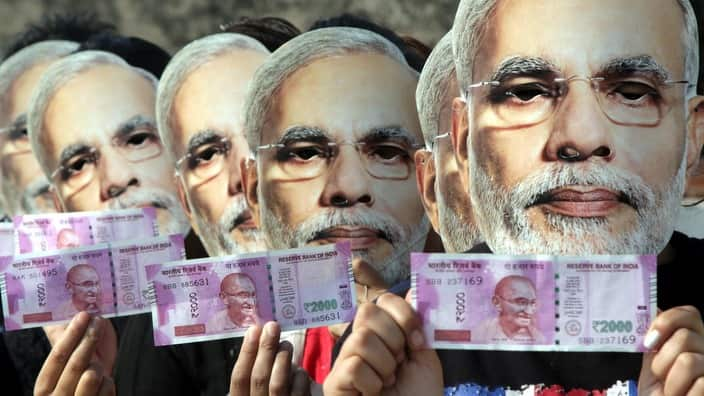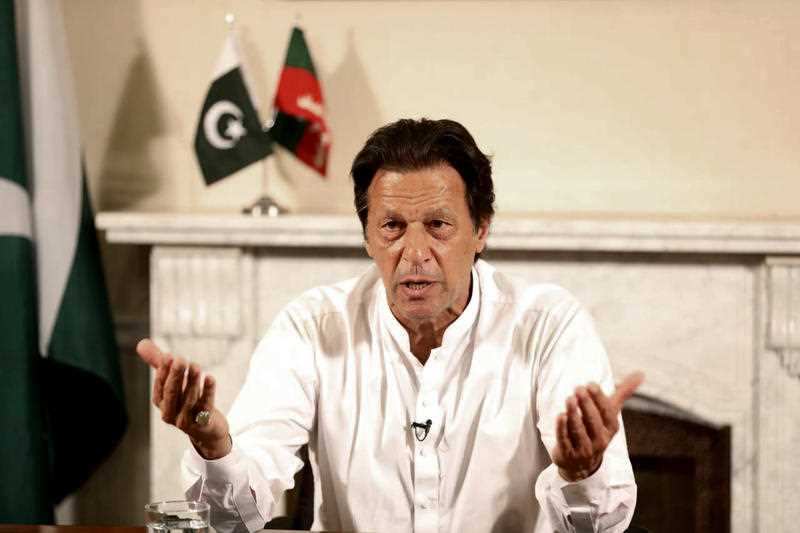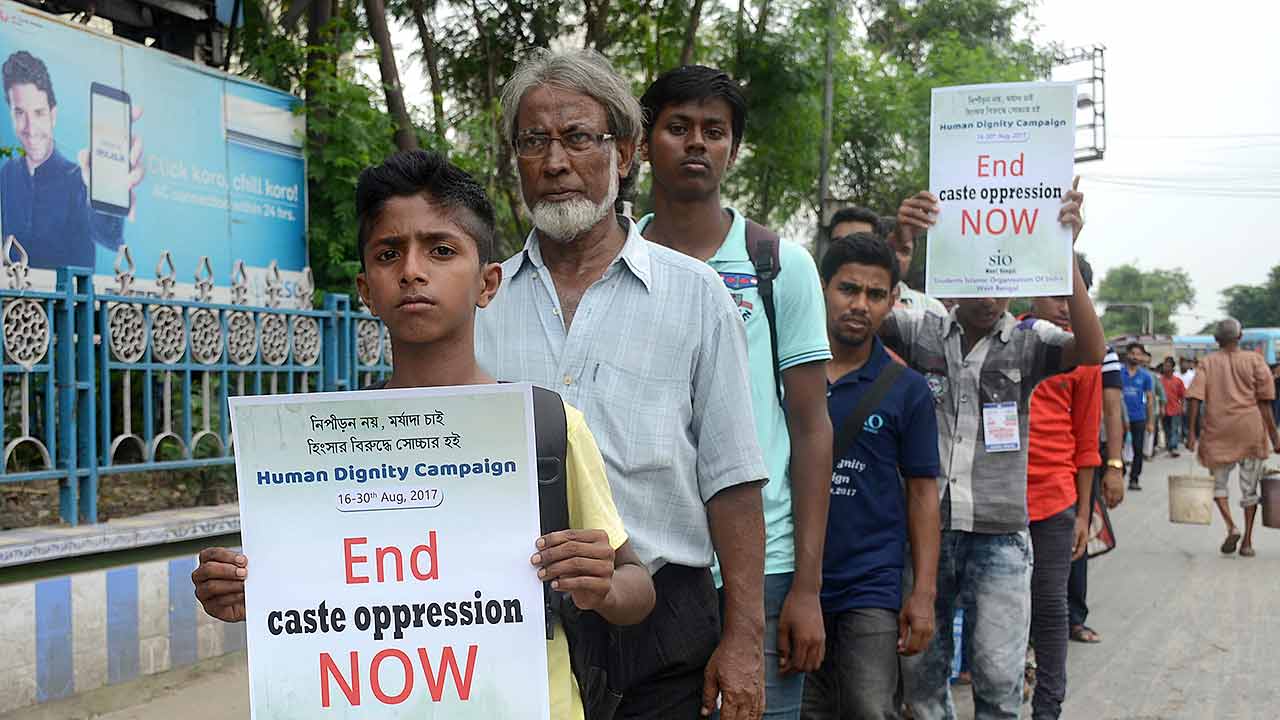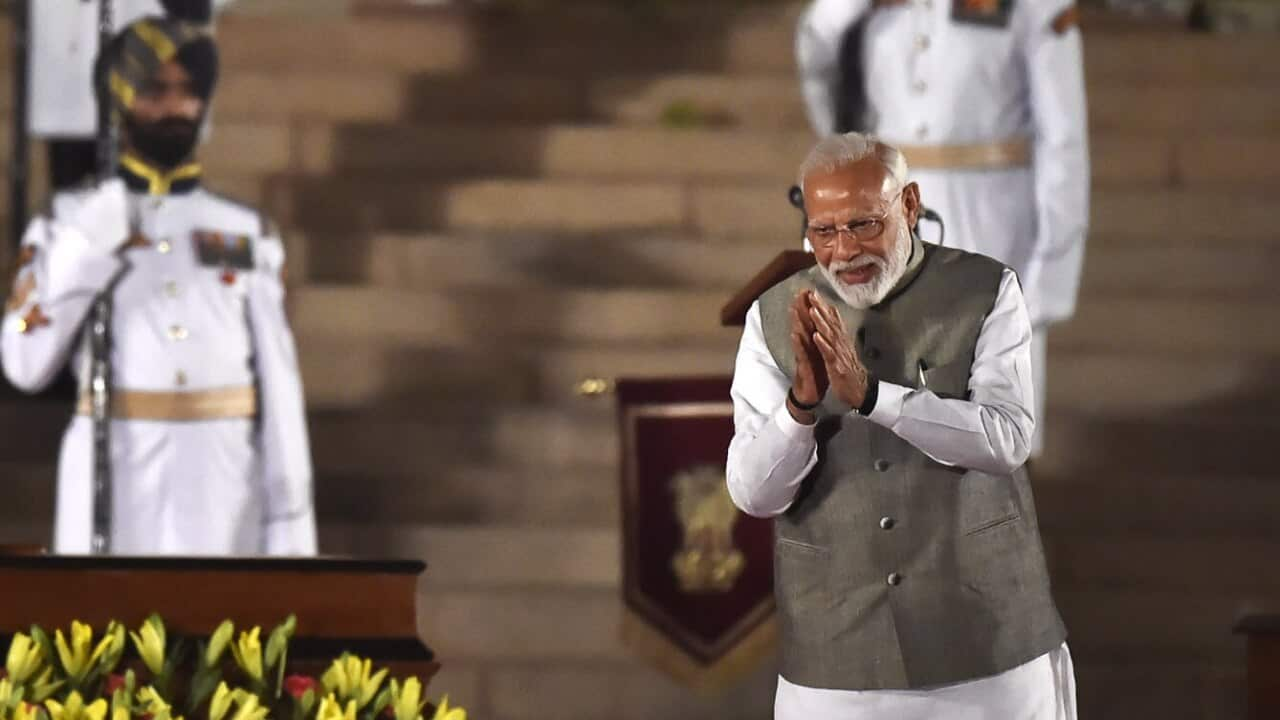Modi's landslide victory in the general election has been largely attributed to his growing popularity, nationalistic narrative, his government's development schemes, and mostly the absence of a strong opposition.
Despite promises made in his victory speech about development and inclusivity, Modi and his Bharatiya Janata Party (BJP) have several challenges ahead of them on various fronts.
Modi's measures on the economic front, his engagement with key foreign nations and what his government does for religious minorities in the country in the next five years will be important to watch.

Narendra Modi is seeking re-election in the post-demonetisation atmosphere of India. Source: AAP Image/ EPA/JAIPAL SINGH
Economy
Modi claimed demonetisation was aimed at removing black money from the economy
As media highlight an economic slowdown over the past five years, this is a big issue Modi will need to deal with.
"Now that BJP has acquired enough confidence in government it must utilise the first 100 days of its second tenure to launch the transformative leap that the economy badly needs", leading English-language daily The Times of India wrote on 24 May.
Prabhat Awasthi, the India head at Japanese financial holding company Nomura, told financial newspaper Mint in an interview on 28 May that "taming the liquidity crisis, pushing private investment and addressing the economic slowdown" are a few of the "immediate tasks" the new government should undertake.
Divya Rajagopal from The Economic Times daily said on 27 May that investors now want "some decisive structural reforms" from the government.
Financial analysts also feel that job creation will be the government's "main challenge".
Some feel that the US-China trade war could also affect India.
"To expect that the US-China trade war will not impact the Indian economy is wishful thinking", Gautam Chikermane wrote in pro-market think-tank Observer Research Foundation on 27 May. "The economic landscape ahead is full of roadbumps. Negotiating this headwind will be Modi’s first challenge", he added.
Modi's major economic initiatives in his first term - such as demonetisation and the imposition of a nationwide goods and services tax - generated widespread reaction, with the common public and analysts divided over their usefulness.
However, some believe that his government did take positive steps in the first term.
"Indeed, the Modi message was underscored by the fact that in times of an economic downturn, and rampant unemployment in a country of the young, the government found imaginative and relatively efficient ways of lending a helping hand to the poor", prominent English-language daily The Indian Express wrote on 24 May.

Imran Khan, chief of Pakistan Tehreek-e-Insaf party, addresses the nation from Islamabad after claiming victory. Source: AP
Foreign Policy
The Pakistan PM congratulated Modi on his electoral victory
How the Modi government shapes its foreign policy will also be significant.
Future relations with nuclear-armed neighbour Pakistan will be crucial as ties have plunged in the past few months after a militant attack in Indian-administered Kashmir which was followed by India's "surgical strike" on a Pakistan-based militant group's camp.
Writing in the popular daily Hindustan Times on 25 May, journalist Shishir Gupta said that the "surgical strikes" during the first term of the Modi government have "raised the bar on India’s response to any terror strike by a group based in Pakistan."
The immediate future doesn't look too promising for India-Pakistan ties.
Pakistan Prime Minister Imran Khan congratulated Modi on his poll win and expressed desire to work for regional peace.
But India has excluded Pakistan from Modi's swearing-in ceremony, though other neighbours have been invited.
Another challenge will come from what is seen as China and Pakistan's growing "nexus" against India.
"China has, for many decades, worked at neutralising India’s capabilities and has used Pakistan to keep New Delhi distracted by supporting Islamabad economically and militarily", former Indian Army officer Maroof Raza wrote for leading TV channel Times Now's website on 27 May.
Also key to watch will be ties with the US, particularly in the wake of American sanctions on Iran.
India has stopped importing oil from Iran after the US waiver granted to eight buyers, including India, ended on 1 May.
Well-known English-language newspaper The Hindu wrote on 30 May that a "more aggressive position on trade" by the US and sanctions against Iran and other countries are "sources of concern for India."

A rally organised by the Student Islamic Organisation as part of their Human Dignity campaign in India. Source: Getty Images
Hindu nationalism
There is worry over the prospects for religious minorities - particularly Muslims - as the last five years of the Modi government saw numerous instances of violence against them.
In his victory speech, Modi sought to reach out to the minorities, saying there will be no discrimination against anyone on the basis of caste, sect and religion, and announced a new slogan that the party will seek "everyone's trust", but concerns remain.
According to a report by Human Rights Watch, Hindu vigilante groups killed dozens of people in the BJP's first term, most of them Muslims, for allegedly slaughtering or transporting cows - which are considered sacred by the majority Hindu community.
Critics fear that such attacks may continue in Modi's second term.
Journalist Sidharth Bhatia wrote in left-leaning website The Wire on 24 May: "The minorities, already crushed, will be completely sidelined and their citizenship and loyalty will be questioned; dissenters will be punished and every institution will be suborned for the 'higher good' - the greater glory of Mother India."
Even within the Hindu community, lower-caste Hindus such as Dalits (formerly known as untouchables) have faced violence from hardline groups.
Some outlets feel that the nature of Indian politics has moved towards Hindu nationalism and away from "Nehruvian secularism", a term based on the name of India's first prime minister Jawaharlal Nehru, and which refers to the official policy of giving equal respect to all religions.
"With the 2019 result, Hindutva [Hindutva nationalism] has pushed Nehruvian secularism to the margins of Indian politics", The Hindu wrote on 23 May.
Share

